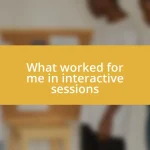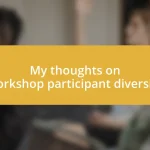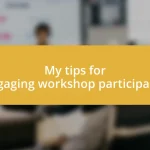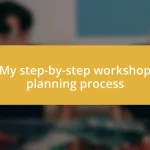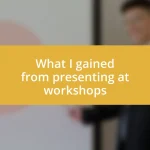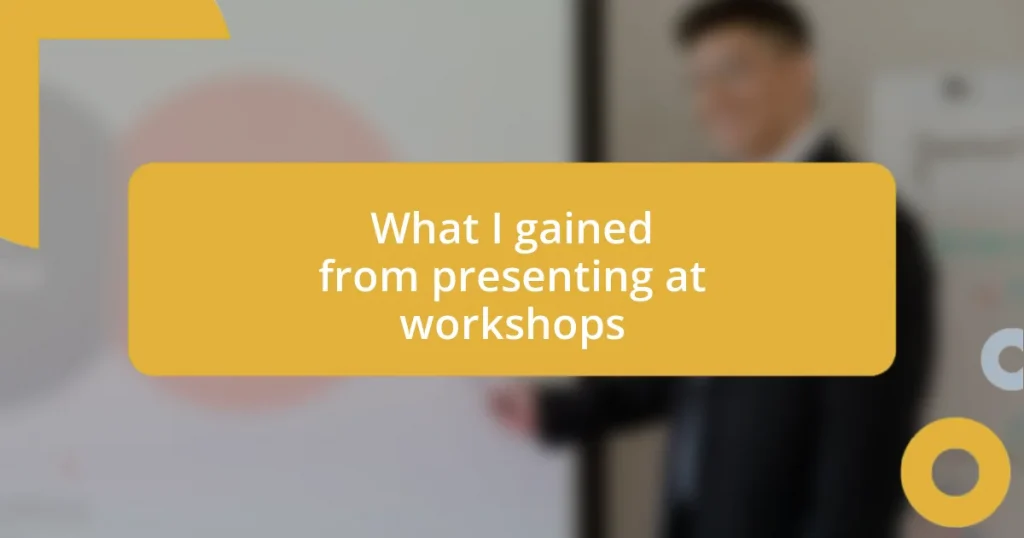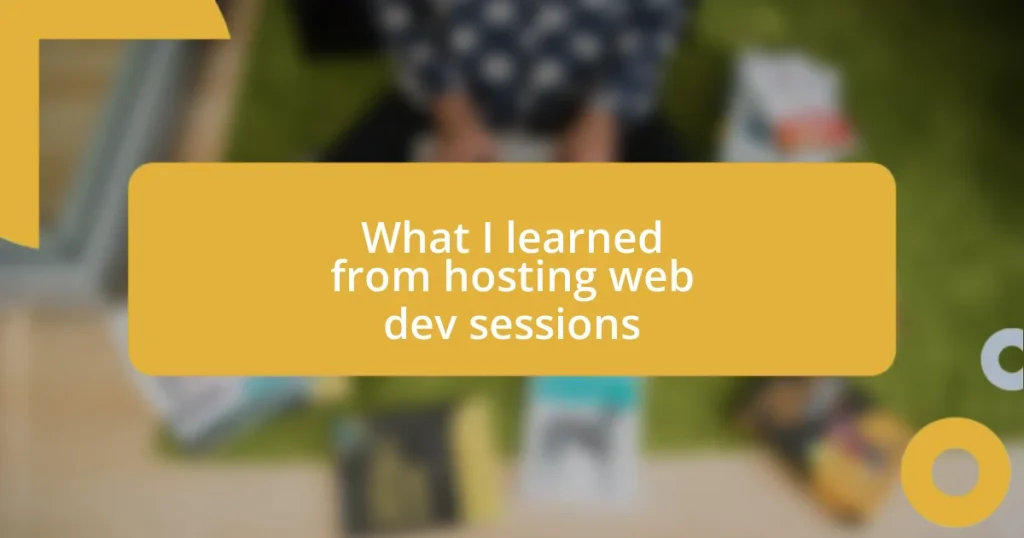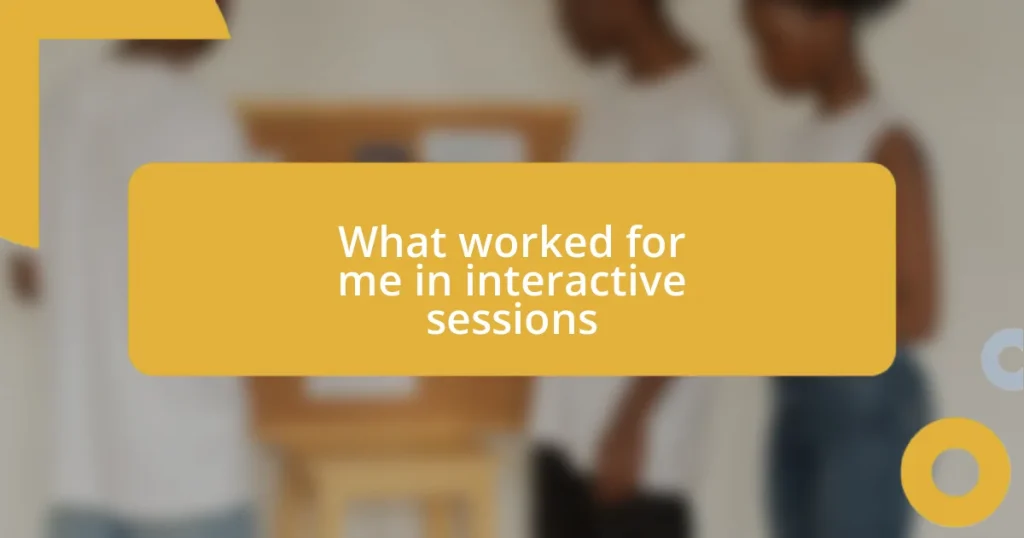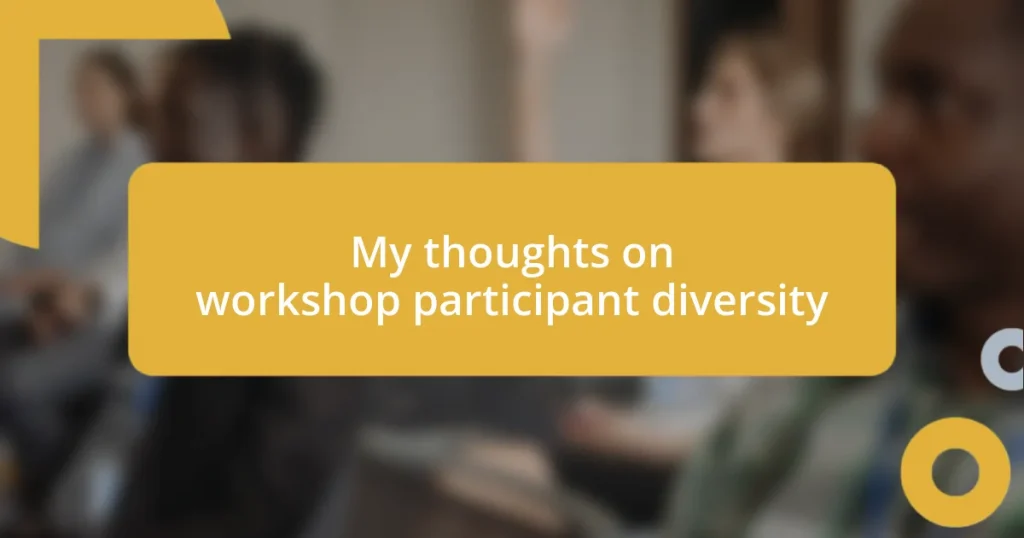Key takeaways:
- Presenting at workshops enhances communication skills through real-time feedback and adaptability to different audiences.
- Building professional networks fosters collaborative opportunities and diverse perspectives, enriching the professional journey.
- Receiving constructive feedback leads to personal growth, resilience, and a dynamic presentation style through open dialogue and reflection.
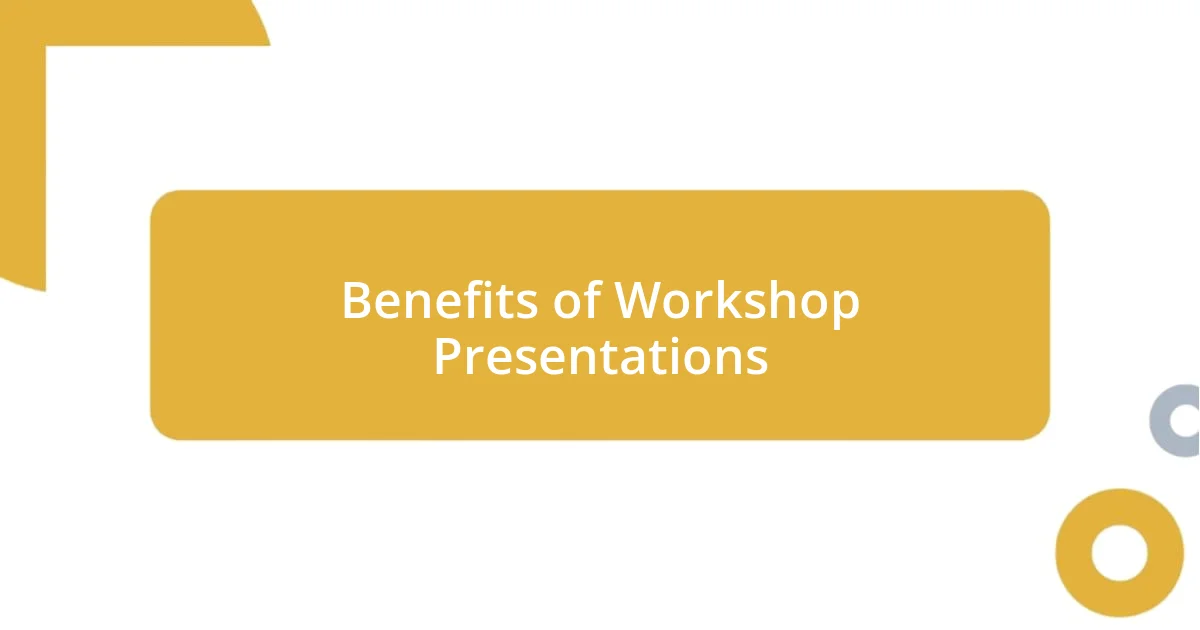
Benefits of Workshop Presentations
One of the most rewarding aspects of presenting at workshops is the immediate feedback I receive from the audience. I remember a time when I shared a project I was passionate about; the enthusiastic nods and follow-up questions really validated my efforts. Doesn’t it feel great to connect with others who share your interests and see their curiosity spark?
Presenting allows me to refine my communication skills in real-time. The adrenaline rush of standing in front of an audience pushes me to articulate my thoughts more clearly and confidently. Have you ever noticed how each presentation sharpens your ability to convey complex ideas into digestible insights? It’s like exercising a muscle that grows stronger with each workout.
Moreover, workshops create a unique opportunity for networking. After one of my presentations, I was approached by several attendees who shared their experiences and insights, leading to collaborative projects that I hadn’t imagined before. Have you found that these connections often evolve into lasting professional relationships? It’s fascinating how one presentation can open doors to a multitude of possibilities.
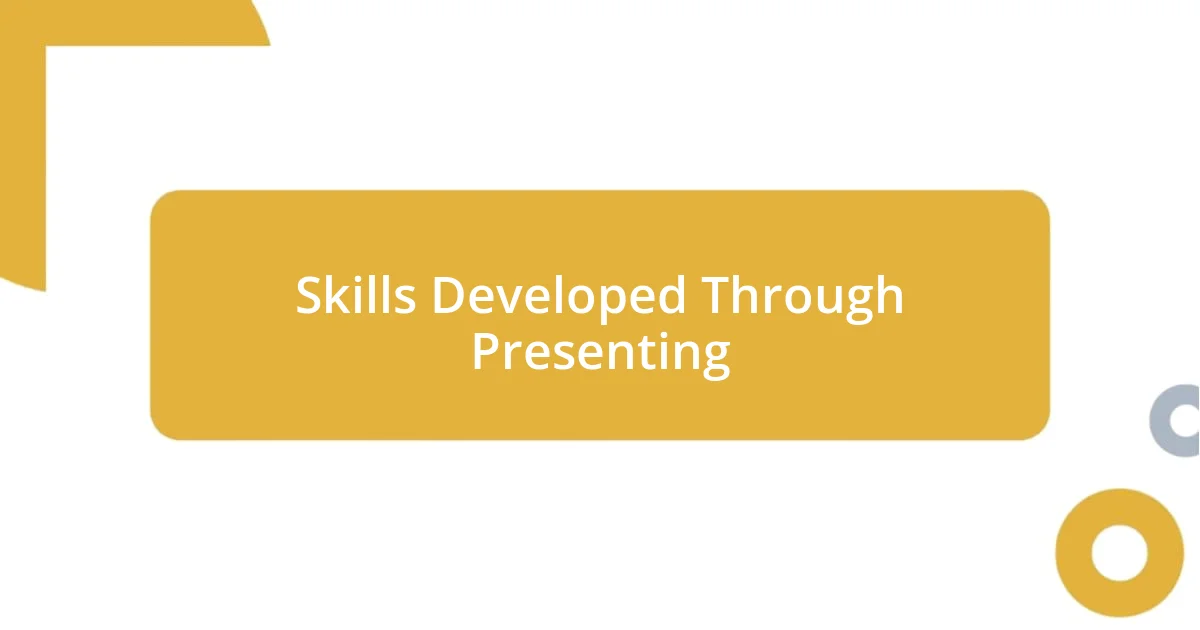
Skills Developed Through Presenting
Through presenting, I’ve significantly enhanced my public speaking skills. I remember one workshop where I stumbled over my words while discussing a complex topic. The experience was uncomfortable, but it taught me to pause, breathe, and regain my composure, transforming a nerve-wracking moment into an invaluable lesson on maintaining poise under pressure. Isn’t it amazing how those iffy moments can lead to substantial growth?
I’ve also improved my ability to tailor content to different audiences. The first time I presented to a diverse group, I quickly realized that not everyone had the same level of knowledge or interest in my subject. By adjusting my examples and simplifying jargon, I was able to engage everyone. This adaptability not only enriched my presentations but also deepened my understanding of the material. Have you found that connecting with your audience shifts your perspective on the topic?
Lastly, during my presentations, I learned to weave storytelling into my content. At one event, I shared a personal story relevant to my topic that captivated the audience. The looks of engagement and empathy on their faces made me realize the power of narrative. Storytelling transformed my information-sharing into relatable experiences, creating a memorable connection with attendees. My journey in this area has sparked my curiosity about different narrative techniques. What storytelling tips have resonated with you in your own presentations?
| Skill | Development |
|---|---|
| Public Speaking | Improved ability to convey thoughts confidently and with clarity |
| Audience Tailoring | Enhanced skills in adapting presentations to different audience levels |
| Storytelling | Mastered incorporating personal anecdotes for deeper engagement |
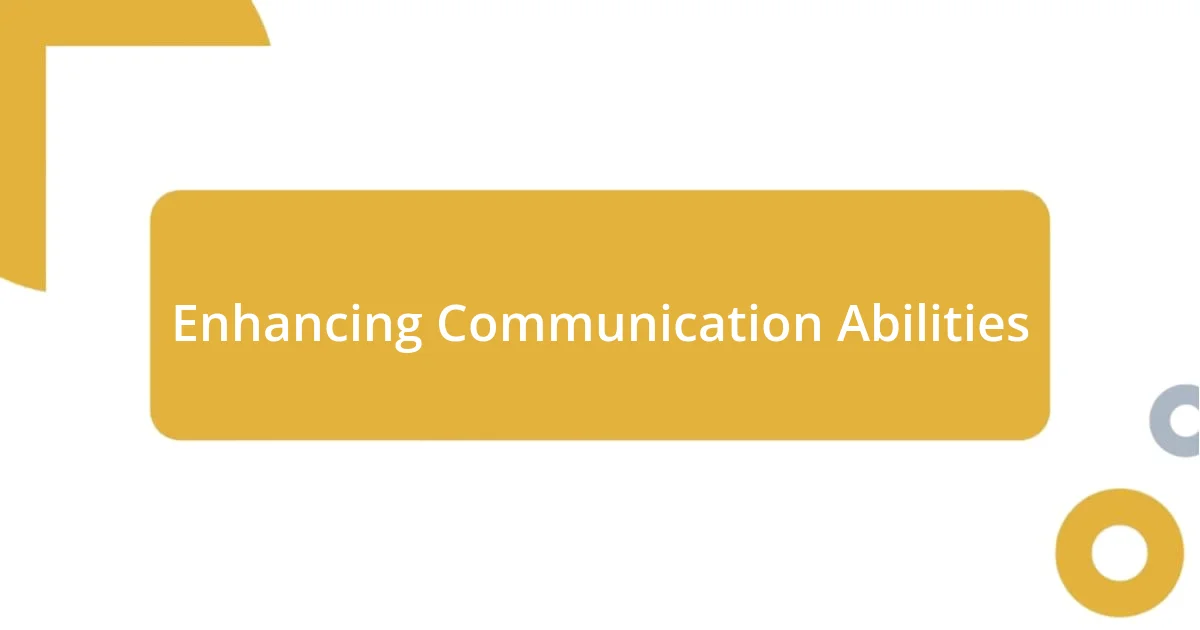
Enhancing Communication Abilities
When I step onto that stage, I often feel a wave of emotions wash over me—excitement paired with a hint of nervousness. One time, while presenting at a workshop on a subject close to my heart, those nerves turned into a powerful connection with the audience. Their reactions, from laughter to thoughtful expressions, helped me see how effectively I could communicate my passion. It’s astonishing how much stronger my ability to engage a crowd has become with each opportunity to speak.
As I reflect on these moments, I realize that effective communication goes beyond the spoken word. I’ve learned to listen actively to audience feedback, adapting my style on the fly. Embracing the unpredictability of live presentations has taught me invaluable lessons about interaction. Here are a few insights I gained along the way:
- Authenticity Matters: Being genuine in my delivery fosters trust and openness with the audience.
- Questioning for Clarity: Engaging the audience with questions can spark discussions that enhance understanding.
- Body Language is Key: I’ve discovered how powerful non-verbal cues can be in reinforcing my message.
This dynamic exchange is what makes workshops so rewarding. The growth feels palpable, and I cherish every moment of learning and connection that enhances my communication abilities.
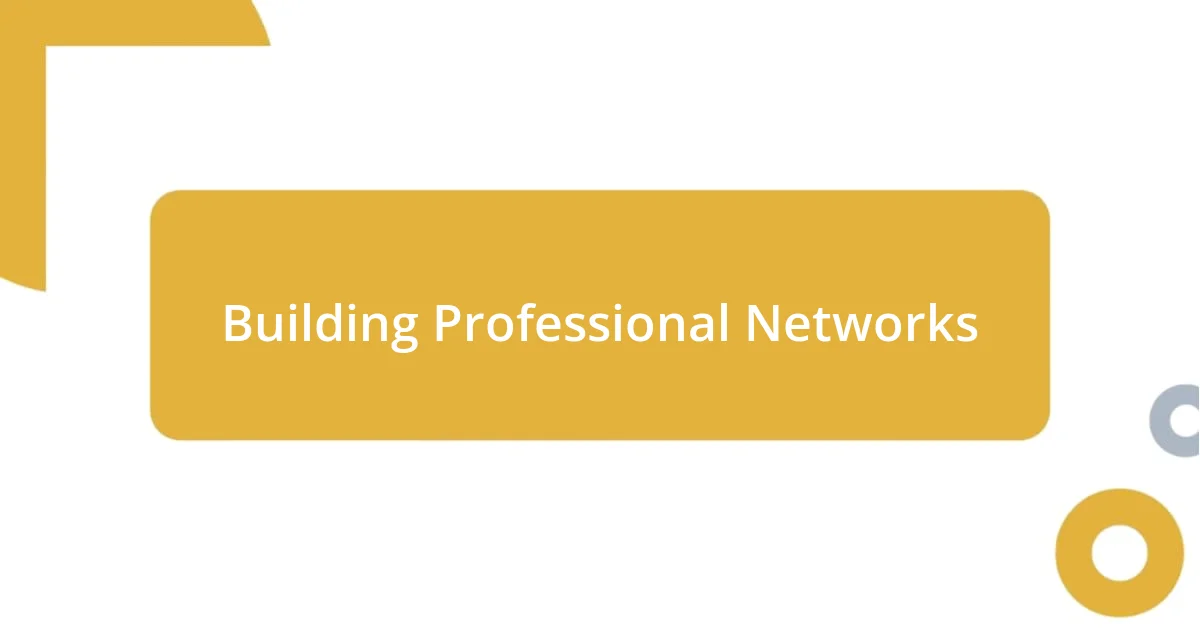
Building Professional Networks
Building professional networks has been one of the most rewarding aspects of presenting at workshops. I remember attending a workshop where I presented on a topic I was passionate about. After my session, a fellow attendee approached me, expressing how my insights had sparked new ideas for their project. That simple interaction blossomed into a collaboration, and it made me realize how valuable these networks can be. Have you ever found inspiration from unexpected encounters?
Connecting with other professionals creates a supportive environment that often leads to new opportunities. At another event, I had the chance to share my experiences with industry challenges; this opened up discussions that ultimately resulted in several mentorship relationships. These connections not only provided practical advice but also enriched my professional journey. It’s fascinating how a few moments of shared dialogue can lead to lasting relationships, wouldn’t you agree?
I’ve also come to appreciate the diversity of perspectives gained through these networks. During one workshop, I met experts from various fields who offered insights that challenged my thinking. Their unique viewpoints helped me broaden my understanding and approach to my work. It made me realize that building a professional network isn’t just about expanding connections; it’s about cultivating a rich tapestry of ideas that fuels growth. How has your networking experience shaped your professional insights?
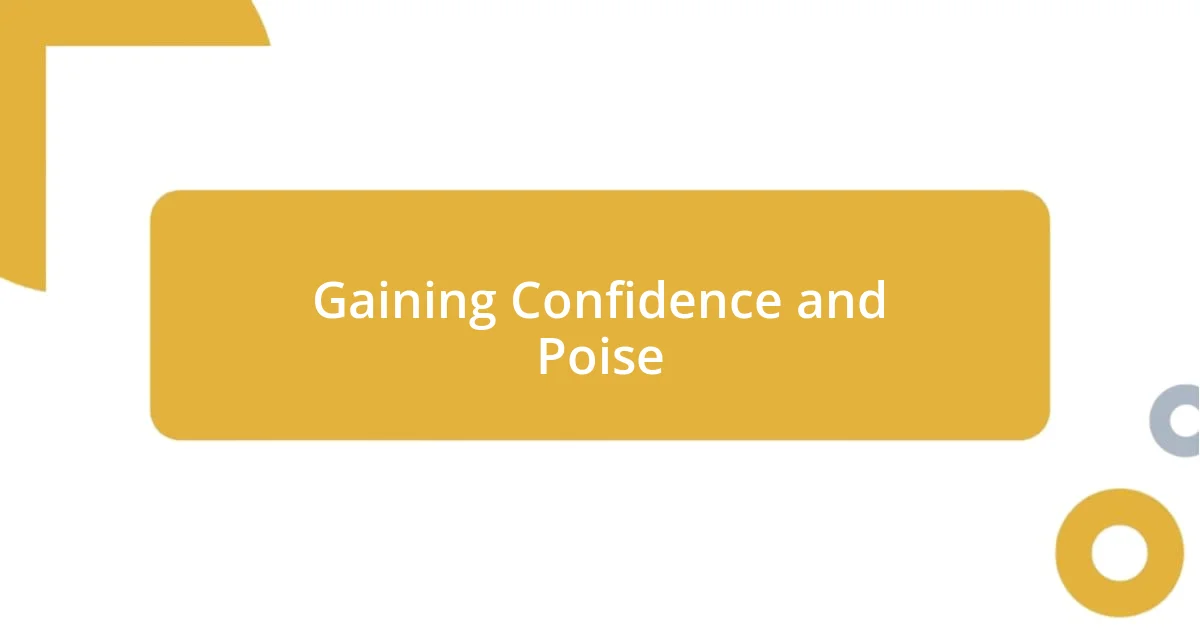
Gaining Confidence and Poise
Gaining confidence through presenting is an experience that profoundly impacts my personal and professional life. I specifically remember a workshop where I felt completely out of my element. As I stood in front of the audience, those initial jitters transformed into a sense of assurance with every word I spoke. I thought, “If I can share my knowledge, surely I can do this!” That moment was a revelation; I realized that my voice matters and has the power to resonate with others.
With each workshop presentation, I’ve noticed my poise has flourished. I’ve become more comfortable with pauses and embracing silence, which used to feel daunting. One particular instance sticks with me: I was met with a challenging question from the audience, and instead of panicking, I took a breath and responded thoughtfully. That controlled moment cultivated a confidence in my abilities, making me feel like I was truly in command. Isn’t it amazing how facing challenges can fortify your self-assurance?
Reflecting on my journey, I often think about the importance of resilience in public speaking. There was a time when a technical glitch almost derailed my presentation, and I felt my heart racing. But instead of succumbing to the stress, I laughed it off and engaged the audience in a spontaneous discussion until everything was sorted out. That experience taught me that confidence isn’t just about delivering your message; it’s about handling surprises with grace. Don’t you think the ability to adapt builds a stronger sense of self-belief?
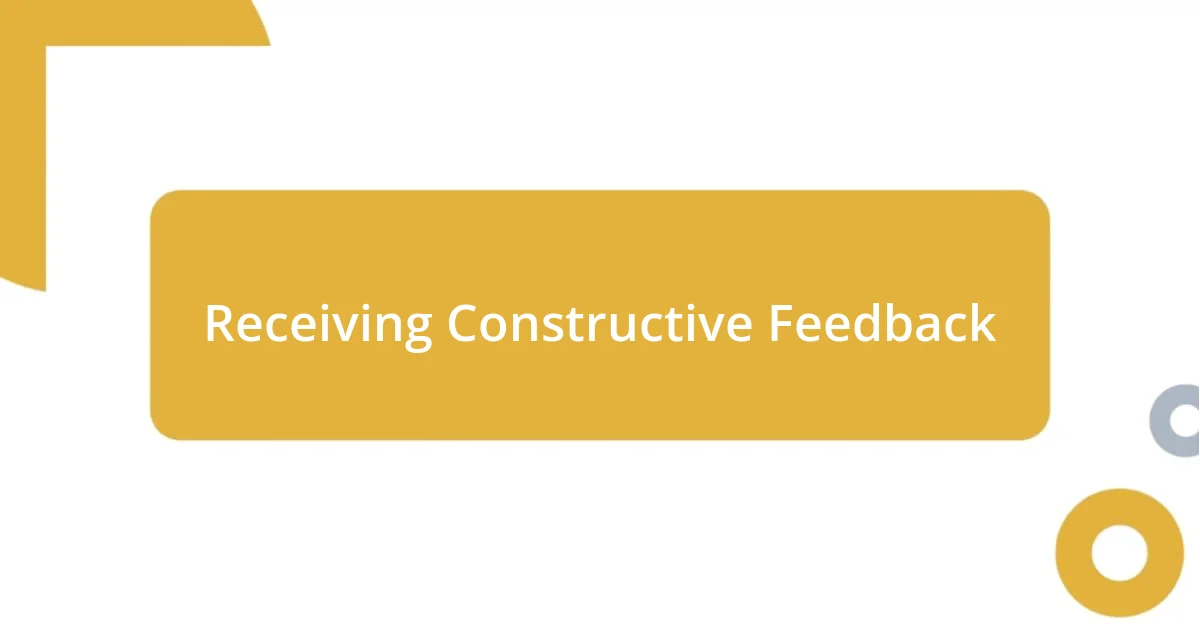
Receiving Constructive Feedback
Receiving constructive feedback is one of the greatest gifts I’ve received through my workshop presentations. I vividly recall a specific instance when an attendee pointed out an area where I could improve my delivery. At first, I felt a pinch of defensiveness, but as I contemplated the feedback later, it became clear that their perspective was invaluable. Have you ever found yourself in a similar situation where initial feedback felt uncomfortable but later proved essential for growth?
What’s fascinating about constructive feedback is its ability to reshape your approach and mindset. After a particularly challenging session, I received a suggestion on how to better engage my audience by asking more open-ended questions. This advice stuck with me, and I began practicing this technique. The next time I presented, I noticed a significant shift in audience interaction and participation. Isn’t it incredible how a single piece of advice can transform your presentation style, making it more dynamic and responsive?
In my experience, creating a culture of openness around feedback is vital. I’ve learned that inviting my peers to share their thoughts openly fosters an environment where everyone feels valued and empowered to grow. During one workshop, I encouraged attendees to give feedback in real-time, and the insights generated were eye-opening. It felt like a collective journey of improvement. How do you foster a feedback-friendly atmosphere in your own presentations?
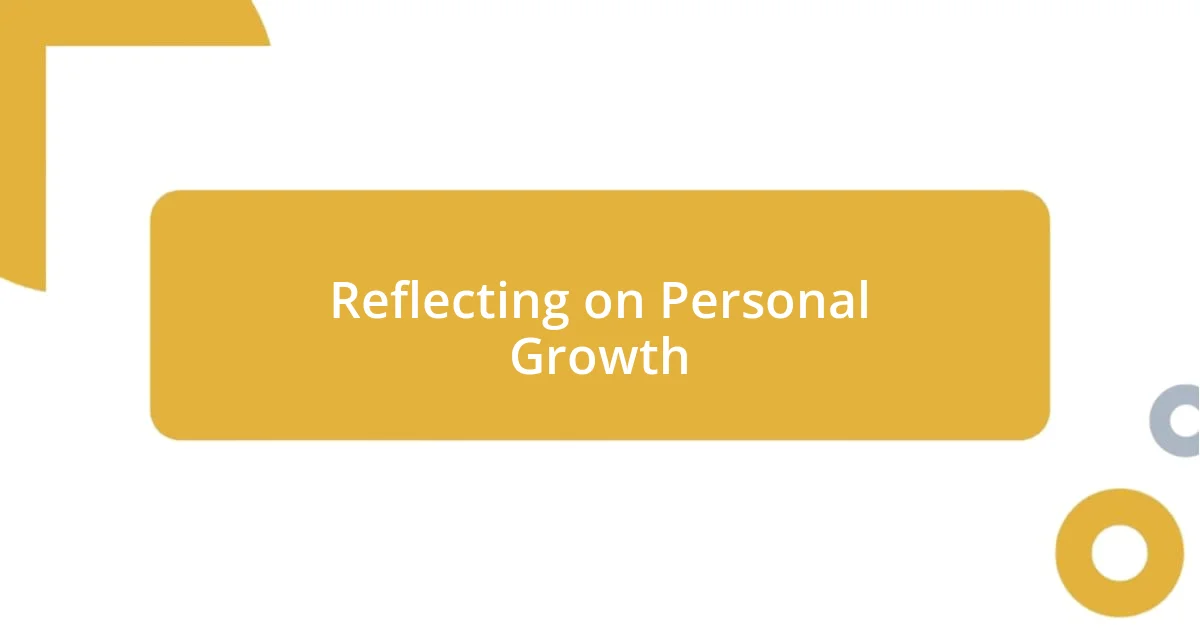
Reflecting on Personal Growth
Reflecting on my personal growth has been nothing short of transformative. I remember a workshop where I stumbled through a complex topic, leaving me feeling exposed and vulnerable. Yet, months later, after revisiting that same subject, I not only conveyed the information clearly but also engaged the audience with enthusiasm. It was a striking realization: our past struggles can be the stepping stones to excellence.
As I think about this journey, I also recognize how vulnerability has become my ally. The initial fear of making mistakes has shifted into a willingness to share imperfect moments. There was a time I flubbed a statistic mid-presentation, and instead of panicking, I owned up to it and asked the audience what they thought. Their laughter and input turned an awkward mishap into a shared learning experience. Have you ever discovered that admitting imperfection can actually draw people closer?
Moreover, I’ve noticed that the more I reflected on my experiences, the more I embraced intentional growth. Setting aside time to consider what went well and what didn’t has allowed me to understand my strengths and areas for improvement more deeply. After a particularly impactful workshop, I took a long walk, thinking about the audience’s engagement and my own delivery. This process of introspection not only solidified my learnings but also ignited a passion within me to keep evolving. Isn’t it fascinating how simple reflection can enrich our journey?

